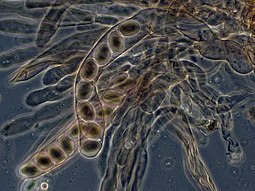Ascospore

Asci of Morchella elata, containing ascospores

Sordaria fimicola ascus plus ascospore
An ascospore is a spore contained in an ascus or that was produced inside an ascus. This kind of spore is specific to fungi classified as ascomycetes (Ascomycota).
Ascospores are formed in ascus under optimal conditions.[1] . Typically, a single ascus will contain eight ascospores. The eight spores are produced by meiosis followed by a mitotic division. Two meiotic divisions turn the original diploid zygote nucleus into four haploid ones. That is, the single original diploid cell from which the whole process begins contains two complete sets of chromosomes. In preparation for meiosis, all the DNA of both sets is duplicated, to make a total of four sets. The nucleus that contains the four sets divides twice, separating into four new nuclei – each of which has one complete set of chromosomes. Following this process, each of the four new nuclei duplicates its DNA and undergoes a division by mitosis.
As a result, the ascus will contain four pairs of spores. Then the ascospores are released from ascus.
The ascospores of Blumeria graminis are formed and released under the humid conditions.[1] After landing onto a suitable surface, unlike conidia, ascospores of Blumeria graminis showed a more variable developmental patterns.[1]
The fungi Saccharomyces produces ascospores when grown on V-8 medium, acetate ascospore agar, or Gorodkowa medium. These ascospores are globose and located in asci. Each ascus contains one to four ascospores. The asci do not rupture at maturity. Ascospores are stained with Kinyoun stain and ascospore stain. When stained with Gram stain, ascospores are gram-negative while vegetative cells are gram-positive.
The fission yeast Schizosaccharomyces pombe is a single-celled haploid organism that reproduces asexually by mitosis and fission. However, exposure to the DNA damaging agent hydrogen peroxide induces pair-wise mating of haploid cells of opposite mating type to form transient diploid cells that then undergo meiosis to form asci, each with four ascospores.[2] The production of viable ascospores depends on successful recombinational repair during meiosis.[3] When this repair is defective a quality control mechanism prevents germination of damaged ascospores. These findings suggest that mating followed by meiosis is an adaptation for repairing DNA damage in the parental haploid cells in order to allow production of viable progeny ascospores.
See also
- Ascomycota
- Ascus
- Meiosis
- Neurospora crassa
- Saccharomyces cerevisiae
- Tetrad (genetics)
References
^ abc Zhu, M., et al. (2017). Very-long-chain aldehydes induce appressorium formation in ascospores of the wheat powdery mildew fungus Blumeria graminis. Fungal Biology 121(8): 716-728. https://doi.org/10.1016/j.funbio.2017.05.003
^ Bernstein C, Johns V (April 1989). "Sexual reproduction as a response to H2O2 damage in Schizosaccharomyces pombe". J. Bacteriol. 171 (4): 1893–7. doi:10.1128/jb.171.4.1893-1897.1989. PMC 209837. PMID 2703462..mw-parser-output cite.citation{font-style:inherit}.mw-parser-output .citation q{quotes:"""""""'""'"}.mw-parser-output .citation .cs1-lock-free a{background:url("//upload.wikimedia.org/wikipedia/commons/thumb/6/65/Lock-green.svg/9px-Lock-green.svg.png")no-repeat;background-position:right .1em center}.mw-parser-output .citation .cs1-lock-limited a,.mw-parser-output .citation .cs1-lock-registration a{background:url("//upload.wikimedia.org/wikipedia/commons/thumb/d/d6/Lock-gray-alt-2.svg/9px-Lock-gray-alt-2.svg.png")no-repeat;background-position:right .1em center}.mw-parser-output .citation .cs1-lock-subscription a{background:url("//upload.wikimedia.org/wikipedia/commons/thumb/a/aa/Lock-red-alt-2.svg/9px-Lock-red-alt-2.svg.png")no-repeat;background-position:right .1em center}.mw-parser-output .cs1-subscription,.mw-parser-output .cs1-registration{color:#555}.mw-parser-output .cs1-subscription span,.mw-parser-output .cs1-registration span{border-bottom:1px dotted;cursor:help}.mw-parser-output .cs1-ws-icon a{background:url("//upload.wikimedia.org/wikipedia/commons/thumb/4/4c/Wikisource-logo.svg/12px-Wikisource-logo.svg.png")no-repeat;background-position:right .1em center}.mw-parser-output code.cs1-code{color:inherit;background:inherit;border:inherit;padding:inherit}.mw-parser-output .cs1-hidden-error{display:none;font-size:100%}.mw-parser-output .cs1-visible-error{font-size:100%}.mw-parser-output .cs1-maint{display:none;color:#33aa33;margin-left:0.3em}.mw-parser-output .cs1-subscription,.mw-parser-output .cs1-registration,.mw-parser-output .cs1-format{font-size:95%}.mw-parser-output .cs1-kern-left,.mw-parser-output .cs1-kern-wl-left{padding-left:0.2em}.mw-parser-output .cs1-kern-right,.mw-parser-output .cs1-kern-wl-right{padding-right:0.2em}
^ Guo H, King MC (2013). "A quality control mechanism linking meiotic success to release of ascospores". PLoS ONE. 8 (12): e82758. doi:10.1371/journal.pone.0082758. PMC 3846778. PMID 24312672.
This Ascomycota-related article is a stub. You can help Wikipedia by expanding it. |